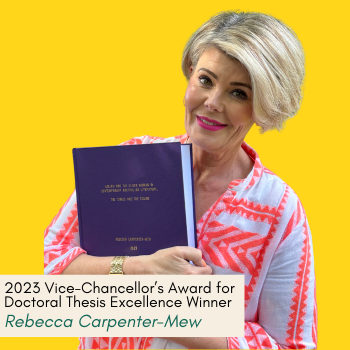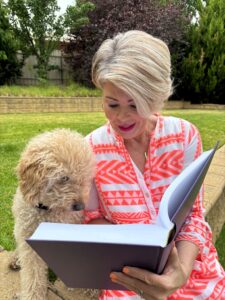
Rebecca Carpenter-Mew is from the College of Humanities, Arts and Social Sciences and is one of the 12 winners of the Vice-Chancellor’s Award for Doctoral Thesis Excellence for 2023. Rebecca was supervised by Associate Professor Tully Barnett and Professor Robert Phiddian from Flinders University.
Rebecca’s thesis Ageism and the older woman in contemporary Australian literature: the tonics and the toxins examined how a cultural problem such as ageism is seen to express itself in the structural consequences of the narrative.
We invited Rebecca to share insights into the PhD journey and what winning this award means.
What does winning this award mean?
Winning this award is very special to me. Imposter Syndrome can run rampant when we think everyone else knows more, is more competent or clever in thesis complexity and execution. I am thrilled that a committee outside my Supervisors and Examiners acknowledge my original contribution to knowledge and recognise the attention to detail and personal voice in the dissertation. I am no athlete; this is my Olympic medal. The congratulatory emails and praise in passing in the Library and The Laneway speaks volumes of how this award is revered amongst staff and scholars. I am chuffed and humbled. The next question… where to display it?
What was your research about?
Ageism and older women in contemporary Australian literature.
Rather than looking at what characters do in a novel I examined in a small selection of Australian texts to illustrate how a cultural problem such as ageism is seen to express itself in the structural consequences of the narrative. Textual meaning is carried by narrative voice, descriptions of domestic spaces and objects act as metonyms for an ageing body, literary and cultural reference are drawn from a narrow pool of stories that value youth (meaning there are no cultural precedence for sharing stories of older women), and proleptic endings all reinscribe dominant, ageist ideology. Whether the use of these strategies is incidental or explicit, it becomes ingrained and absorbed as our cultural reference for ageing. So too, an author’s age at the time of writing impacts the depiction. There is a greater tendency to stereotype when authors write outside their age demographic. In comparison, those who write from lived experience enliven the literary treatment of older women; they agitate socially determined scripts of ageing to rewrite and refashion age for their own purposes. Such approaches have the capacity to model alternative, constructive pathways for readers as they navigate their own ageing in an increasingly ageing society.
![]()
What was been one of the hardest parts of the journey?
I started the PhD journey when I was 52 after an established career as an English high school teacher. It’s really hard starting from scratch and being an apprentice again! I assumed I would be brilliant at thesis writing but I wasn’t, and this was a huge psychological curveball I had to work through. I gave my Supervisors some very ropey writing in the first two years. I actually wrote one chapter five times. They were very patient and knowledgeable about what was stage appropriate. Another challenge of the journey was having the courage of conviction to stand by my flag in the sand. My original contribution to knowledge challenged celebrated literary fiction and for a while I was apprehensive in calling out some novels and authors who had won prizes and the esteem of the literary establishment. I had done my research; the evidence was watertight and my ‘why’ was strong. Eventually I felt if I didn’t make this case for systemic ageism in Australian literature, who would?
Tell us about your PhD journey
I left teaching at the end of 2019 and started my PhD journey in early 2020. I was so keen, so excited and busting to meet like-minded PhD students and immerse myself into the fantasy of university life. To be honest, it was a solitary and isolating experience that was so different to a busy high school environment. Many HDR students wanted their own space and needed time to write without my disturbing them, and rightly so. Covid hit; we were all in lockdown and retreated to home. Everyone pivoted to online spaces and the saviour for me was The Write Bunch. I needed to adapt and psychologically rebrand a different university experience that would suit me and the times we were living through.
What was highlight of your student life at Flinders?
There were many highlights because I was determined to embrace every opportunity available. I joined the CHASS Postgrad Association as a committee member for two years; I took the opportunity to enrol in many of the valuable workshops the OGR offered through iEnrol (such as Hugh Kearns’ Project Management and Dealing with Imposter Syndrome, Social Media for Researchers, Writing for The Conversation among many others); I had a blast when I entered the 3MT Competition and reached the finals; I enjoyed thought-provoking sessions of fortnightly CHASS English and Creative Writing Seminar Series and Masterclasses; I started working in the Learning Lounge and still enjoy helping others; the relationship with my Supervisors was a significant highlight, so too was the feedback from the examiners.
The icing on the PhD cake was spending my candidature writing online with postgraduates who were women around my age (the majority spanning mid 40s to mid 60s, one in her 70s) across different disciplines and in different states. This initially started as The Write Bunch which the OGR offered for one hour on Friday mornings with Prof Tara Brabazon and Dr Dani Milos. Each postgrad was at different stage of the PhD process which was informative and very motivating because, as one of the candidates observed, ‘we saw how the sausage was made’. There was no attrition. Being part of this group of women who supported each other through the journey, dealt with the unexpected, got angry, shed tears, juggled family commitments, shared resources, demonstrated tenacity and vulnerability continues to this day. In fact, I met three of them for dinner last week in Adelaide and we keep in touch in person with our interstate counterparts at least every four months.
How did your supervisors support you during your candidature?
I was so fortunate and grateful to have Assoc Prof Tully Barnett and Prof Robert Phiddian as my Supervisors. I trusted their guidance and expertise. Equally as important was their trust in me to do due diligence to the process and research. Tully and I met most fortnights and I always looked forward to our conversations; she stretched my brain power and always pushed me to reach further than I thought possible. She supported me in conference presentations and practices, was at every 3MT heat and practice, provided me with valuable and honest feedback on chapters. She was steadfast in championing my project and never conveyed panic even when my writing was shocking! It was kismet to be having coffee with Tully when my results were released. There was lots of hugging, happy tears, high-fiving, and whooping. It was a delight to share this moment with her. Robert was available for chats and advice but kept a distance from reading my thesis until nearer the submission date and this allowed for objective commentary and some final structural changes that made the thesis super shiny.
![]()
What advice would you give to those who are about to undertake a PhD?
Trust the process but drive the project yourself. Read, read, read as your default position. Supervisors have very complex timetables so be empathetic and clear in your communication regarding meetings, submission deadlines, and feedback. There is time for collaboration; equally, know when it is time for solo writing and thinking. Be prepared for life getting in the way. Don’t panic if you have disparate chapters in the first two years; the mortar that binds the story together becomes clearer towards the end. Embrace all the opportunities Flinders provides. Stand by your flag in the sand. You’ve got this!
![]()
Tell us about yourself
I live in Blackwood, am married to Anthony who is an Engineer, have two daughters (Zoë, 19 and Fleur 18) and have a groodle called Lulu. I have just had my knee replaced and the recovery has been a challenge! I love the fluidity of fashion, going to wineries, dining out with friends, and glamping.
![]()
What are your future goals and plans? / Where do you see your career heading in the future?
The plan is to publish some articles, turn the thesis into a book, or perhaps two… one academic text and one fictional story. Ideally, I’d like to be working on these while my husband and I travel a bit. Tapping away on the keyboard and thinking literary thoughts while he’s fishing nearby sounds like a good combination. We’ve been in the workforce for a long time and dedicated our time to our daughters who are now both young adults; the freedom to choose how we spend our working week is indeed a privilege and an exciting change.
![]()
Where are you now?
Currently, my week is filled with a variety of jobs; casual work in the OGR with Industry Engagement, being a Learning Advisor in the Learning Lounge and soon I’ll be doing some Research Assistance for Professor Robert Phiddian. I enjoy being on the Bedford Park campus because it has been my academic home for the last four years and I still feel connected to the energy. The campus is so beautifully situated, the views are spectacular plus it’s close to home!


